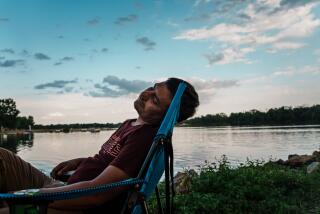Suspect Says He Trained at Al Qaeda Camps
- Share via
HAMBURG, Germany -- A Moroccan accused of providing logistical support to the Sept. 11 suicide pilots told a court Tuesday that he and other members of the alleged Hamburg terror cell trained in Al Qaeda camps in Afghanistan, but he said the training was for purely religious purposes.
Mounir Motassadeq is the first person accused of direct involvement in the 2001 attacks on the World Trade Center and the Pentagon to go on trial anywhere. He is charged with aiding and abetting the murders of more than 3,000 people, but he said he knew nothing of plans for the attacks.
Motassadeq, a 28-year-old electrical engineering student, testified for four hours on the opening day of his trial. His attorneys had previously denied that he attended Al Qaeda camps, but Motassadeq said in court that he had spent a month in a camp outside the southern Afghan city of Kandahar in July 2000.
He said that Mohamed Atta, believed by investigators to have been the leader of the Hamburg cell, gave him detailed instructions on how to reach Afghanistan, but he testified that he had no direct knowledge that Atta himself ever attended a camp. He acknowledged that many of the other men accused of belonging to the cell -- alleged pilots Marwan Al-Shehhi and Ziad Samir Jarrah and supporters Ramzi Binalshibh and Zakariya Essabar -- all went to camps in Afghanistan. He said he met Essabar outside the Kandahar camp nearly every day for prayers.
Motassadeq said he did not learn the camp was financed by Osama bin Laden until after he arrived there. He said he never saw Bin Laden but was told by others that Bin Laden visited regularly, sometimes staying overnight nearby.
Motassadeq said the men from Hamburg never discussed becoming suicide bombers, which he said would be a violation of his faith. In fact, he said, training in the camps was an end in itself, a fulfillment of religious duty.
“We spoke about the jihad, but we meant struggle,” Motassadeq said. “I decided to study five years electrical engineering, then go back and bring electricity to a village and the poor people. Then I did the jihad too. That’s the jihad I decided for.
“As a Muslim, according to the Koran, it is your duty to learn how to shoot, swim and ride a horse. That’s why I wanted to be trained militarily. It’s normal, like serving in the Bundeswehr [German army]. Afghanistan was the nearest country for us to be trained militarily,” he said.
Motassadeq stressed several times that he was not asked by anybody to join the jihad when he left the camp after a month.
“Nobody gave me any orders,” he said.
Motassadeq did not make an opening statement. Instead, he answered questions from his attorneys, prosecutors and the judge. Even though he said he was unaware of the Sept. 11 plot, his testimony provided a first detailed glimpse into the relationships among the Hamburg men. Chief Judge Albrecht Mentz established in an hourlong examination that Motassadeq knew all the alleged cell members and was particularly close to Atta, with whom he met regularly, as often as four times a week, for several years.
Motassadeq said he prayed with Atta, ate with him on the weekends, and studied and worked with him at a computer company, where several of the cell members were employed part time.
When asked by the judge what kind of topics the men discussed, Motassadeq said: “Religious and political topics, such as the problems in Kosovo, Chechnya and Palestine.” He said their discussions were never anti-American or anti-Jewish.
He said there was an understanding within the group “that there is a war going on in Palestine and this problem needs to be solved.” When asked how, Motassadeq said: “We need a political solution. The people need to communicate. Violence never solves any problem.... Suicide missions are not allowed, according to the Koran. There are rules even in war -- you are not allowed to kill women, children and old people.”
The men frequently discussed their desire to fight in the separatist Russian republic of Chechnya. In late 1999, Motassadeq said, Atta, Al-Shehhi, Binalshibh, Jarrah and Essabar all decided to go there to fight. Al-Shehhi was the first one to fly to Afghanistan and the first to come back, less than two months later. “Marwan [Al-Shehhi] said: ‘They don’t need fighters anymore. That’s why I had to come back.’ ”
Al-Shehhi and Atta told Motassadeq how to get to the Afghan camps, what hotels to stay in and how to make contact, he said. Fly to Quetta, Pakistan, they told him, and ask any taxi driver how to get to the “Taliban office.” People at that office, an old hospital, knew how to arrange entry into Afghanistan, he said.
Motassadeq said he crossed the border in taxicabs with a handful of other Arabs. They did not even need to present their passports, he said.
Of his own trip to Afghanistan, Motassadeq, who is married and has a child, said he went because the timing was right.
“Our baby was about to be born soon,” he said. “I knew if I don’t go now, I will never go.”
For four weeks, Motassadeq said, he was trained “theoretically and practically” in how to use and fire Kalashnikov rifles. About 100 men were at the camp when he was there, he said. The seven recruits in his group stayed together in one tent and fired “three to four bullets a day on targets -- I didn’t always succeed.” Motassadeq said there were four levels of training at the camp, but he never went beyond the first level.
At the end of the trial’s opening day, Mentz told Motassadeq that he had told the court some “new and surprising” things.
“Please consider now [whether] to take one or two more steps. Think about whether you want to stick to your statement that the camps really had no ideological or political background,” the judge said.
Mentz urged Motassadeq to consider whether the trips of the cell members to the camps -- all within six months and in two coordinated waves, which Motassadeq confirmed -- really were a coincidence or part of a broader plan.
“Take your time, think about it. You don’t have to answer tomorrow,” the judge said.
*
Times staff writer McDermott reported from New York and special correspondent Laabs from Hamburg.
More to Read
Sign up for Essential California
The most important California stories and recommendations in your inbox every morning.
You may occasionally receive promotional content from the Los Angeles Times.










